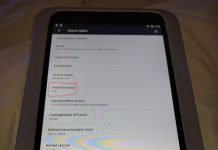 I’ve been following the news coming out of WWDC and it had me wondering how long it’s going to take until we move toward a one-OS system. By that, I don’t mean ‘Apple Wins!’ or ‘Microsoft Wins!’ Rather, I mean: ‘mobile wins!’
I’ve been following the news coming out of WWDC and it had me wondering how long it’s going to take until we move toward a one-OS system. By that, I don’t mean ‘Apple Wins!’ or ‘Microsoft Wins!’ Rather, I mean: ‘mobile wins!’
Let me explain. A lot of the ‘features’ Apple is introducing this time seem to be less brand new things and more a porting-over of stuff that exists in one platform and onto the other. So, the desktop OS gets Siri. The mobile OS gets facial recognition on photos. It’s the same rationale behind the cross-device synchronization features all the e-book programs have. It’s so handy to be able to read on my phone when I’m on the bus, then get home and resume where I left off on my tablet or book-sized device. So I can see why they would want to achieve this same effect with other aspects of their OS.
But…what’s the point? If I can download Pages on my phone or my iPad or my desktop and get right to work, why have separate versions in the first place? Why not just make the ‘mobile’ OS a little more robust, treat the real computers like iPads with keyboards and just have the one system? Would it be any different than what we have now?
Same with Windows—the Beloved just got a new Windows phone, and they have taken some pains to make it look just like the interface on our Windows laptop. So why not go beyond just looks and actually make them functionally equivalent? Why not have Chrome notebooks which run on just plain old Android? Why not have Windows notebooks which run a mobile OS?
There are so few things I do these days—reading included—which need to be tied to a computer. I long-ago ditched iTunes and put my teaching music straight into a Dropbox folder so I could access it on the fly while in class. I am contemplating doing the same with my books, liberating them from the tightly managed world of Calibre and just having Dropbox directories. Then when I get a new device, be it phone or computer or tablet, I can just install Evernote, a web browser and Dropbox, and have immediate access to all my stuff. That’s a much better system than the way I used to do things. So why do I need multiple operating systems for it?
































Why not just put your Calibre library on Dropbox? I already do that plus all my important files I need, so they’re always ready if I need to switch devices, or even if a computer or mobile device should die on me. I can then be back up and running within minutes of switching.
The reason is because some of us use desktops for more than word processing and require more processing power than mobile CPU’s can provide given their battery limitations. The concept that desktops or even laptops will become obsolete is an idiotic notion.
There once was a time when most computing was done using terminals that were connected to a big mainframe computer with a cabled network. Drop the need for hardwired connections (cables), and call that mainframe at the end of the internet highway a “cloud.” With SSDs, local storage diminishes so events and corporations are herding us toward greater and greater reliance upon this cloud. Our devices become more and more like terminals of old. A Chromebook is just a vehicle for the Chrome web browser. All of your stuff is in a cloud somewhere.
The problem here is that the internet that makes this work isn’t fast enough or robust enough to equal the performance of those terminal systems of yesteryear. This is especially problematic in the US and Canada. In addition to lacking the requisite horsepower, these clouds are privately held and, thus, have no mandate for public service nor are they subject to constitutional limits such as due process. Owners of digital assets will be morphed from owners to renters.
The fundamental question here is whether your internet life is best when rented or owned.
While the cloud has a number of benefits its downsides are often overlooked.
One of these is latency.
15 years ago the company I worked for had a small enterprise server on-site. Dozens of users connected to this using simple terminals and it also ran processes connecting to external systems – websites, EDI and the like.
Although we had occasional complaints about it being slow these were not the norm.
Fast forward to a different company last year using a cloud-based system to handle its data via a 100MB connection to the internet.
Despite the improvements in technology and computing power the users of the latter system spent a lot more time waiting for it than the former.
They were different companies doing different things so they’re difficult to compare directly but the delays affecting the users in the latter case would never have been accepted by the former because they would have dramatically reduced productivity.
Rarely does one size fit all to best effect.